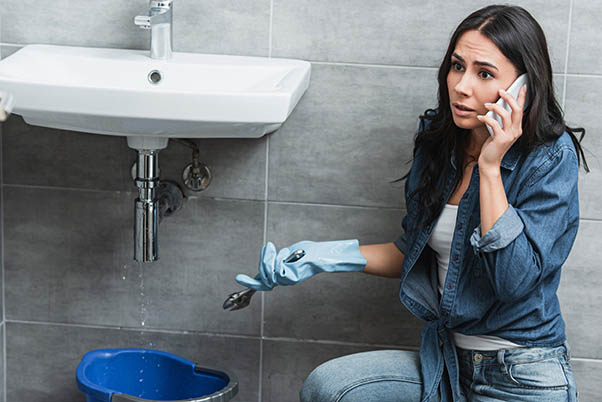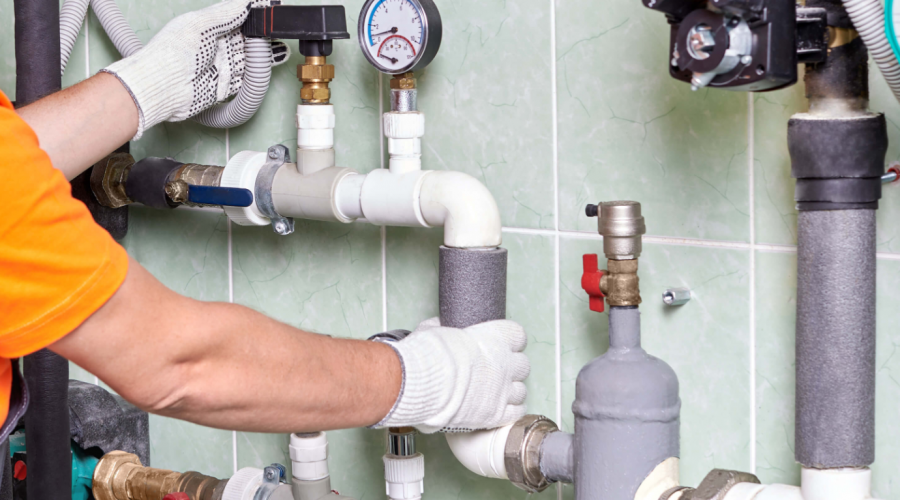We have uncovered this article pertaining to Expert Tips for Managing a Plumbing Emergency Until Help Arrives down the page on the web and accepted it made sense to discuss it with you on my blog.

Pipes emergency situations can strike any time, creating stress and anxiety and possible damages to your home. Whether it's a ruptured pipe, a clogged drain, or a leaky faucet, knowing how to manage the situation until a professional plumbing technician shows up can conserve you from additional issues. This post supplies necessary emergency situation pipes ideas to assist you reduce damage and restore control during a plumbing situation.
Switch off the Water System
The primary step in any type of plumbing emergency is to shut down the water. For local problems, such as a leaking faucet or toilet, switch off the shutoff near the component. In the case of a major leakage or ruptured pipeline, find your home's main water shut-off shutoff and transform it off promptly. Understanding the location of these valves ahead of time can conserve important time during an emergency situation.
Address Tiny Leaks with Temporary Solutions
Little leaks can promptly come to be significant troubles if left untreated. Utilize these temporary solutions up until professional aid shows up:
- Pipe Tape or Epoxy Putty: Use water resistant tape or epoxy putty to briefly secure the leak.
- Rubber and Clamp Method: Cover a piece of rubber or an old internal tube around the leak and secure it with a pipe clamp or duct tape.
- Containers or Towels: Place pails under the leak to contain water and protect against damage to floor covering or furniture.
- While these fixes aren't irreversible, they can help decrease water loss and damage.
Unclog Drains Pipes Safely
A clogged drainpipe can be an aggravating and unpleasant problem. Below's exactly how to tackle it: - Use a Bettor: For sinks or toilets, a bettor can frequently remove minor obstructions. Ensure you utilize the correct kind of bettor for the fixture.
- Warm Water and Dish Soap: For grease-related obstructions, pour a combination of hot water and meal soap down the drain to separate the oil.
- Avoid Chemical Drain Cleaning company: While tempting, chemical cleaners can create more damage than excellent, particularly to older pipelines.
- If these methods do not work, avoid making use of excessive pressure, as it may intensify the clog.
Manage Overflowing Toilets
An overruning toilet can trigger prompt chaos. Right here's what you need to do: - Stop the Water Flow: Get rid of the storage tank cover and press down on the flapper shutoff to quit water from entering the bowl. Shut off the water to the toilet if required.
- Plunge Carefully: Make use of a toilet plunger to remove the clog, but avoid hostile plunging, which can create spilling or further damage.
- Consist of the Spill: Use towels or a wipe to tidy up water rapidly to prevent flooring damages.
Shut Off Your Hot Water Heater
In certain emergencies, such as a burst pipe, it's smart to shut down your water heater. This avoids overheating or damage to the system when water quits moving. Switch off the power supply to the water heater (electric or gas) and let it cool off to prevent prospective dangers.
Momentarily Quit a Ruptured Pipeline
A ruptured pipeline can lead to significant water damage in minutes. To reduce the problem:
- Clamp or Wrap the Pipe: Utilize a pipeline clamp, rubber, or air duct tape as a momentary seal.
- Draw Away Water Flow: Preferably, divert the water right into a pail or container to restrict damages to bordering locations.
- Maintain the Location Dry: Usage towels or a wet/dry vacuum cleaner to get rid of standing water.
- Call a specialist plumbing professional immediately to address the trouble completely.
Manage Frozen Pipes Carefully
In cooler environments, icy pipelines are a typical emergency. If you think a frozen pipe: - Switch off the Water: Shut down the major water system to avoid a burst pipe.
- Defrost Gradually: Utilize a hairdryer, heating pad, or warm towels to thaw the pipe progressively. Prevent open flames or extreme warmth, as these can harm the pipeline.
- Examine for Leaks: Once the pipeline is defrosted, check for cracks or leaks prior to transforming the water back on.
Avoid Further Damages
Taking fast action to minimize damages can conserve you time and money in the long run. Right here's how:
- Relocate Valuables: Eliminate furniture, electronics, and various other products from the affected location.
- Usage Sandbags: For flooding scenarios, area sandbags around the area to reroute water.
- Turn off Electrical energy: If water has reached electrical outlets or devices, shut off the electricity to stop shocks or fires.
. Have an Emergency Plumbing Package
Prepare a basic pipes emergency kit to handle minor concerns successfully. Your kit should include:
- Flexible wrench
- Plumbing's tape
- Pipeline clamps
- Towels and rags
- A bettor
- Epoxy putty
- Bucket.
- Having these tools handy can make a significant distinction in your ability to handle emergency situations.
Know When to Call a Professional.
While quick fixes can assist momentarily, specific pipes problems call for instant professional focus. Call a plumbing if:. - A ruptured pipe creates comprehensive flooding.
- Drains pipes or toilets stay clogged in spite of your efforts.
- You see consistent leakages or water pressure problems.
- Your hot water heater is leaking or malfunctioning.
- Without delay getting in touch with an expert ensures the problem is fixed appropriately and prevents additional difficulties.
Conclusion.
Plumbing emergency situations can be overwhelming, however with the appropriate knowledge and tools, you can handle the scenario effectively up until aid arrives. By shutting off the water system, resolving small leaks, and making use of short-lived solutions, you can lessen damages and maintain your home safe. Remember, these suggestions are momentary remedies; always speak with a certified plumbing professional to take care of the origin of the problem. Prep work and fast reasoning are your ideal allies in any plumbing emergency.
8 Helpful Tips for Managing Plumbing Emergencies at Home
If your plumbing system hasn’t failed once, wait for it because almost everyone has a story to tell. Sometimes, it could be simple emergencies such as a leaking pipe, a blocked cistern, or even a big burst pipe. In situations like this, you need to have some handy tips to save you some money and from possible damages.
Take care of minor issues early.
Sometimes, you could have avoided an emergency by taking proactive measures while it was still early. Some major plumbing emergencies can be a result of an ignored minor issue. We recommend that you have items like plumbing tapes and other related items. A plumbing tape can allow you to manage minor leaks before the plumber arrives.
Cut off the water supply.
This tip is essential in almost any type of leakage problem. For problems like minor leakages in the toilet or kitchen, turn off the supply that takes water to the affected pipes. If the leakage is a major pipe, you must shut off the supply valve to the entire building. This will help you avoid flooding your home and neighbors if you share a flat.
Know your plumbing system
Folks typically move into a new apartment without understanding the water supply around the building. This can prove disastrous if a water emergency arises and the plumber is far away. The previous tip will prove useless if you don’t practice this one. More importantly, know where your water shut-off valve is located – you’ll need that knowledge to prevent potential home floods.
Have some common handy tools
There are lots of plumbing emergencies that you can handle without hiring a plumber. That’s why you must keep some tools available always. Some tools that you can use to fix simple plumbing emergencies easily include plumbing tapes, screwdrivers, thread seal tapes, plungers, pliers, tape measures, and rubber gloves.
Insulate your pipes from cold
You’ll save yourself from many plumbing expenses if you protect your water pipes from the cold. This is because of the harmful effects that cold weather can have on your pipes. During winter, your pipes can burst from being overly expected to freezing temperatures. So, make sure insulators are there to keep the pipes working correctly.
Avoid practices that will clog your toilet.
Many people indulge in practices that can damage the plumbing system of the entire building. One of these is when they use their toilet to dispose-off garbage. They flush all kinds of things, such as paper towels, bandages, hairs, female sanitary products, etc., down the toilet. This will block your toilet in the long run, incurring unnecessary expenditures. Dump such waste in the trash instead.
Check your dials regularly.
Sometimes, there could be leakages in your home without noticing them in time. So, constantly monitor your water meter dial. If the dial is reading when there is nobody using water, this is an indicator that there is leaking. Check for leaks immediately. Call a plumber as soon as possible if you can’t find any.
https://www.constructionplacements.com/8-helpful-tips-for-managing-plumbing-emergencies-at-home/

Do you appreciate reading up on What to Do While Waiting for an Emergency Plumber? Give a remark directly below. We would be glad to listen to your insights about this blog. Hoping that you come back again soon. Appreciated our posting? Please share it. Help somebody else discover it. Thanks a lot for being here. Kindly pay a visit to our blog back soon.
Book
Comments on “Critical Plumbing Solutions: Actions to Follow Until A Plumber Arrives”